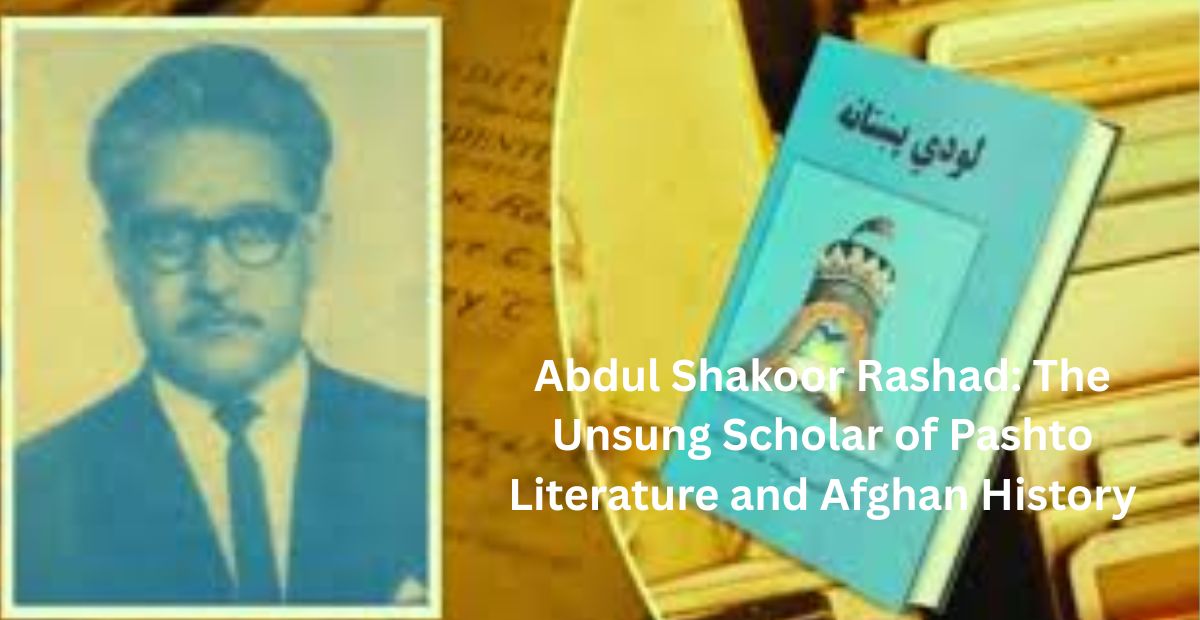Abdul Shakoor Rashad (Pashto: عبدالشکور رشاد) was not just a professor or a poet — he was a cultural icon, a dedicated scholar, and a powerful voice for Pashto language and Afghan identity. Born on November 14, 1921, in Kandahar, Rashad dedicated more than seven decades of his life to education, literature, and the preservation of Afghan heritage. His remarkable contributions continue to influence scholars and students across Afghanistan and beyond.
Early Life and Education
Abdul Shakoor Rashad displayed exceptional intellect from an early age. He graduated from school at just 12 years old and began teaching by the age of 13 in 1934. His early start in academia laid the foundation for a lifelong journey of knowledge and service.
In 1948, Rashad traveled to India to further his studies. During his time there, he authored the comprehensive book Lodi Pashtoons, a 351-page historical analysis of the Lodi dynasty, while also mastering the Hindi language.
Academic Career and Contributions
Professor Rashad was a pillar of Kabul University, where he served as a professor of Pashto language and literature. In 1957, he became a member of the prestigious Pashto Tolana and was later appointed as its Assistant Director. His academic influence extended internationally when he was appointed as a Pashto instructor at the Institute of Eastern Research in Leningrad in 1961, where he served for over two years.
Upon his return to Afghanistan, Rashad continued teaching at Kabul University and held the position of Chief of the Pashto Department. He was fluent in Pashto, Persian, Arabic, Urdu, Hindi, Russian, and English, and had working knowledge of Sanskrit, Hebrew, and Japanese. His ability to write poetry in multiple languages is a testament to his linguistic brilliance.
Despite writing over 105 books, only 36 were published, with hundreds of his articles still cited today in literary and historical circles. Some of his most notable works include:
- Puṣhtānah shuʻarāʼ: A collective biography of Pashto poets
- Da Kandahār yādāṣhtūnah: A historical and cultural exploration of Kandahar
- Ḥaz̤rat Abū Bakr Ṣiddīq: A biographical account of the first Caliph of Islam
- Da Dawlat Lawāṇay dīwān: A collection of his Pashto poetry
- Da Puṣhto pakhwānay Alafbe: A brief history of the Pashto script
Political Engagement and Social Impact
Rashad’s intellectualism was complemented by his political activism. In 1946, he served as Director of Kandahar City Selection Committee, and by 1947, he became Deputy Mayor of Kandahar. He later joined the reformist youth movement “Weesh Zalmian” and was elected as its parliamentary representative in 1952, though his election results were controversially invalidated by government officials.
His activism put him among the ranks of notable Afghan leaders and thinkers like Hasham Maiwandwal, Abdul Rauf Benawa, and Abdul Hye Habibi. Even during the Soviet invasion and the Afghan Civil War, Rashad refused to leave the country. He continued to write poetry and articles under pseudonyms, sharply criticizing communist policies and warlordism.
Later Life and Legacy
After the 1978 communist coup, Rashad officially retired from public service but remained intellectually active. He continued his research, mentoring young academics and contributing to Afghan literary journals.
On December 1, 2004, Abdul Shakoor Rashad passed away in Kabul at the age of 83. He was buried in the Kandahar University Campus, a fitting resting place for a man who dedicated his life to learning and enlightenment.
Final Thoughts: Remembering Abdul Shakoor Rashad
Abdul Shakoor Rashad’s life is a powerful reminder of the enduring value of education, cultural pride, and resistance through knowledge. His contributions to Pashto language and Afghan history are unmatched. As Afghanistan faces new challenges, the legacy of scholars like Rashad remains a guiding light for future generations.
Keywords:
Abdul Shakoor Rashad, Pashto language professor, Afghan historian, Kabul University, Pashto Tolana, Lodi Pashtoons, Weesh Zalmian, Pashto literature, Afghan poets, Kandahar history
